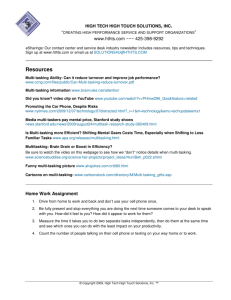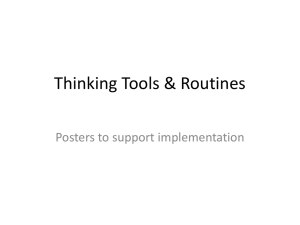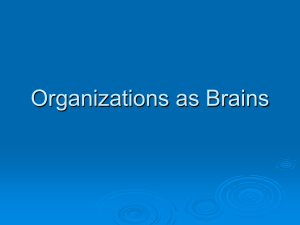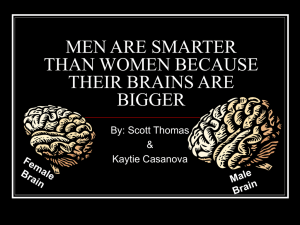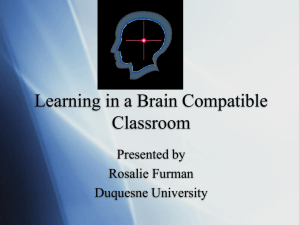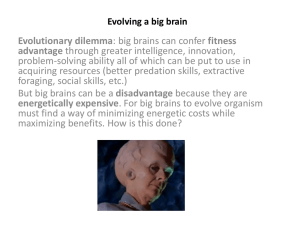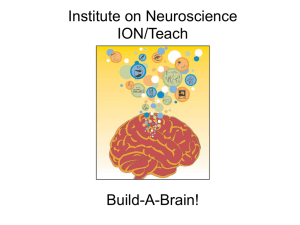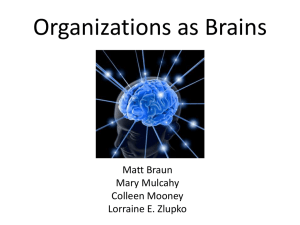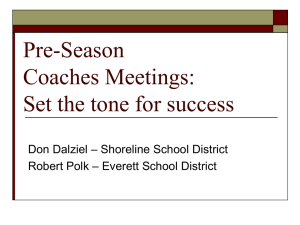Technology Social Networking Article
advertisement
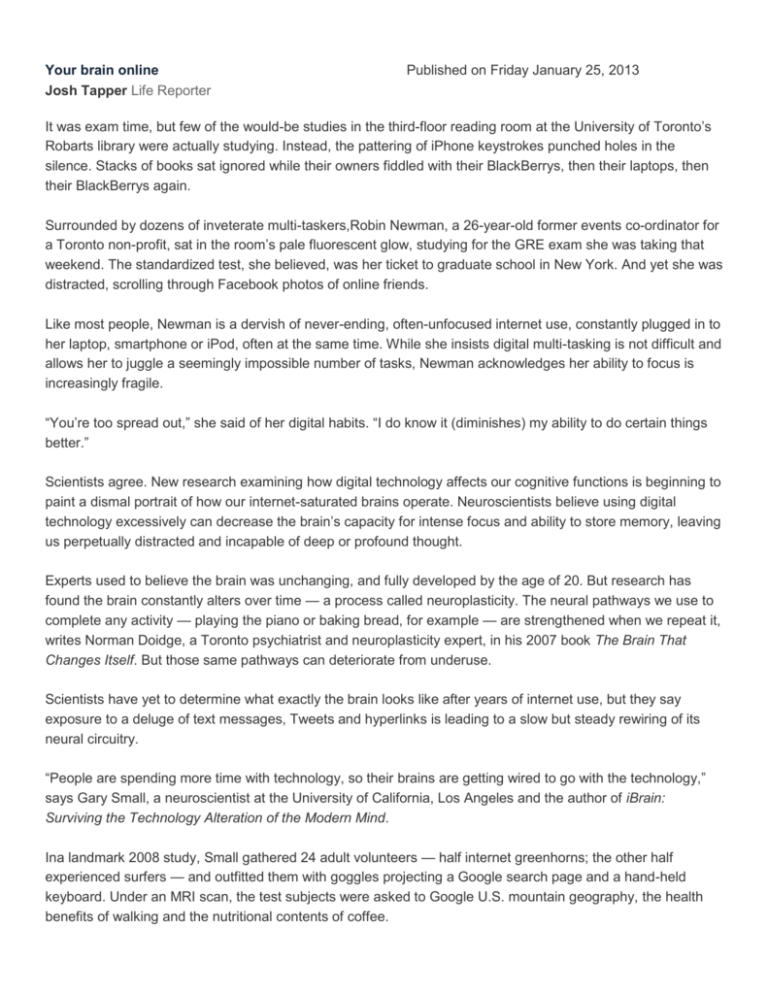
Your brain online Josh Tapper Life Reporter Published on Friday January 25, 2013 It was exam time, but few of the would-be studies in the third-floor reading room at the University of Toronto’s Robarts library were actually studying. Instead, the pattering of iPhone keystrokes punched holes in the silence. Stacks of books sat ignored while their owners fiddled with their BlackBerrys, then their laptops, then their BlackBerrys again. Surrounded by dozens of inveterate multi-taskers,Robin Newman, a 26-year-old former events co-ordinator for a Toronto non-profit, sat in the room’s pale fluorescent glow, studying for the GRE exam she was taking that weekend. The standardized test, she believed, was her ticket to graduate school in New York. And yet she was distracted, scrolling through Facebook photos of online friends. Like most people, Newman is a dervish of never-ending, often-unfocused internet use, constantly plugged in to her laptop, smartphone or iPod, often at the same time. While she insists digital multi-tasking is not difficult and allows her to juggle a seemingly impossible number of tasks, Newman acknowledges her ability to focus is increasingly fragile. “You’re too spread out,” she said of her digital habits. “I do know it (diminishes) my ability to do certain things better.” Scientists agree. New research examining how digital technology affects our cognitive functions is beginning to paint a dismal portrait of how our internet-saturated brains operate. Neuroscientists believe using digital technology excessively can decrease the brain’s capacity for intense focus and ability to store memory, leaving us perpetually distracted and incapable of deep or profound thought. Experts used to believe the brain was unchanging, and fully developed by the age of 20. But research has found the brain constantly alters over time — a process called neuroplasticity. The neural pathways we use to complete any activity — playing the piano or baking bread, for example — are strengthened when we repeat it, writes Norman Doidge, a Toronto psychiatrist and neuroplasticity expert, in his 2007 book The Brain That Changes Itself. But those same pathways can deteriorate from underuse. Scientists have yet to determine what exactly the brain looks like after years of internet use, but they say exposure to a deluge of text messages, Tweets and hyperlinks is leading to a slow but steady rewiring of its neural circuitry. “People are spending more time with technology, so their brains are getting wired to go with the technology,” says Gary Small, a neuroscientist at the University of California, Los Angeles and the author of iBrain: Surviving the Technology Alteration of the Modern Mind. Ina landmark 2008 study, Small gathered 24 adult volunteers — half internet greenhorns; the other half experienced surfers — and outfitted them with goggles projecting a Google search page and a hand-held keyboard. Under an MRI scan, the test subjects were asked to Google U.S. mountain geography, the health benefits of walking and the nutritional contents of coffee. Among the internet-savvy volunteers, Small recorded heightened brain activity, especially in the prefrontal cortex, which is critically responsible for attentiveness, problem-solving and strategic thinking, compared with the web neophytes. Years of internet use left their cranial fireworks sparking brighter than the newbies. He then asked the novices to spend one hour online each day for a week. When they returned to the test centre a week later and lay through a second brain scan, Small discovered an astounding development. “After just five days of practice, the exact same neural circuitry in the front part of the brain became active in the internet-naïve subjects,” he later wrote in iBrain. “Five hours on the internet, and the naïve subjects had already rewired their brains.” The results, Small has written, were the first evidence that internet use (in this case, Google searching) tinkers with our brains. And they were, to an extent, positive: the internet-savvy volunteers were exercising a larger portion of their brains than those with little internet experience, notably in the regions controlling decisionmaking and complex reasoning. But while the brains of heavy internet users were more active, there was evidence in Small’s study suggesting they also were less efficient. Consider what happens when we’re faced with a basic 500-word online news article, peppered with hyperlinks. As science journalist Nicholas Carr details in his 2010 book, The Shallows: What the Internet Is Doing To Our Brains, when a reader scrolls over a hyperlink, the brain stops processing the content on the page, allowing the prefrontal cortex a brief moment to consider the new option: to click or not to click. That disruption halts the information gathering and interpretation process. Scientists say the more often that happens — as we wander through Wikipedia or traverse a web of Reddit links — the harder it becomes to retain information. In other words, “we’re optimizing our brains for distracted, piecemeal, very rapid-paced information processing,” Carr said in an interview. “And we’re probably weakening our ability to screen out distractions and read deeply and concentrate on one thing.” All that stimulation has a negative effect, says psychologist Larry Rosen, author of iDisorder: Understanding Our Obsession with Technology and Overcoming Its Hold on Us. “The problem is that when you have a hyperactive brain, you’re not thinking very clearly.” For better or worse, digital multi-tasking has become ingrained in our busy, harried lives. Children text message friends while video-Skyping with their parents; lovers at the movies spend the previews writing emails on their iPhones; teenagers from YouTube to Twitter to text message without hesitation. In a 2010 Kaiser Family Foundation study of more than 2,000 8- to 18-year-old Americans, the average respondent claimed nearly 11 hours of daily media multi-tasking, a more than three-hour daily increase since 1999. But scientists are divided on its cognitive effects. In 2009, a team of Stanford researchers ran groups of “heavy media multi-taskers” and “light media multi-taskers” through a series of cognitive tests in which college students were shown an image of a red rectangle and asked to spot its reorientation when a second image, which included a distracting blue rectangle, was displayed. The heavy media multi-taskers failed miserably. “They showed very high distractibility, an inability to filter out information and difficulty with focus,” Clifford Nass, a Stanford University sociologist and study author, said in an interview. “They literally are worse at switching from one task to another.” While switching back and forth from one digital device to another may appear seamless in practice, brain power, Nass said, is effectively spread too thin for hard, critical thinking or effective memory recall. As tasks are piled on, the prefrontal cortex finds it increasingly difficult to manage multiple actions. This inability to focus, Nass said, means heavy multi-taskers often perform “bottom-up” rather than “top-down” thinking — they attempt to draw conclusions from many pebbles of information instead of solving problems by searching for a big-picture solution, a central threat. Nass’s results suggest the ceaseless to and fro corrupts critical thinking. “High multi-taskers … don’t use their insights, they don’t leverage their understanding of things to make things more efficient,” he said. But if, as scientists posture, the brain is wired like a humming city, always adapting, digital multi-tasking can be harnessed. The brain can be trained. “It’s a bit like a physical workout,” Small said. “You exert more energy initially, but with practice you can do more, you’re efficient. If we get too much of a good thing and we’re constantly multi-tasking, the quality of our lives deteriorates. It’s a question of balance.” When Newman wakes up each morning, her BlackBerry, which also serves as an alarm clock, rests on the floor next to her bed. The smartphone, along with an iPhone and laptop, are with her throughout the day, and the trio of digital technology is at arm’s reach when she falls asleep. Even when she tells herself to close the lights at 10 p.m. she, like many, often falls into a distracted pattern online. Next thing she knows, the clock strikes 1 a.m. “You’ve just been aimlessly searching through the internet, finding yourself in that snowball effect of one click to another click,” she said. Newman performed poorly on her GRE last month. In the weeks since, she has considered rewriting the fourhour-long exam. She acknowledges her attempt to study while juggling social media was inefficient, if not an entirely bad idea. “You have to be disciplined to say, ‘I have this tool of the internet, how am I going to use it?’” she says. “You can use it for really great purposes, or really no purpose at all.”
